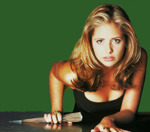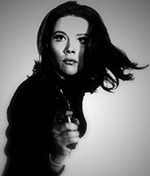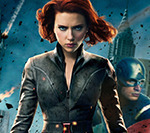
An article in the
New Statesman last week has created a lot of discussion on the interwebs. The title was
I Hate Strong Female Characters, a real go-for-the-jugular, in-your-face statement if ever there was one. The writer was female, which is a good thing, because if it had been a bloke all hell would have broken loose. I came across the article via Facebook and strongly suggest you read it before going any further here.
Finished? Okay...so here's my ten cents' worth.
While the writer makes some valid points, an awful lot of it the article is a rather labored effort to make a point. "Strong female character" here seems to actually mean "strong female character in a superhero movie," because, with the exception of
Bridesmaids, that's all she talks about. Her knowledge of even those films seems fairly superficial. Although she doesn't actually mention
Buffy the Vampire Slayer, the editors decided to illustrate the article with a picture of the character. It's therefore not clear if she includes Buffy in the reviled "strong female character" category, but the implication is there nevertheless. Was Buffy a "strong female character?" Well, yes, she was strong, but she was also vulnerable, which is what made her such a great character.
The thing with movies bases on comic books, of course, is that the industry (both the comic book industry and the TV/motion picture industry) has historically seen those franchises as predominantly of interest to guys. They now know that is not the case, but they also know that their audience, male and female, would have a collective coronary if they just arbitrarily changed the sex of a major character. Incorporating more women into lesser roles is certainly a great idea, but in an industry dominated by men, it's going to take some time.
That male domination is what has led to the rather one dimensional idea of what constitutes a "strong" character. Just as most men seem to think that women like the same things in men that men like in women -- a pretty face (note to guys - no, we don't), they also seem to think that the attributes that make what they regard as a strong male character are the same for a strong female character. Hence all the kickass girls.
But why the focus on superhero films? They are, by definition, cartoonish. I love them, but I don't expect them to contribute to feminism, any more than I expect them to reflect reality in any other way. As for comparing Shakespeare's Richard II to female characters in superhero flicks -- is this woman on crack? You can't compare Richard II to ANY of the heroes in superhero films. These are not movies that you go to with any expectation of character nuance and depth.

For strong characters with complexity and vulnerability you'd watch a drama or a really well-written comedy. The fact that there are now female characters who get to do some of the ass-kicking IS an advance. All Catwoman did in the old Batman series was simper and purr and let her gang (all guys) battle the Dynamic Duo. The only really well-rounded female character back in the day was
Emma Peel in
The Avengers -- sure she could kick ass, but she was also a physicist with a nice turn in dry wit.
And let's talk
Doctor Who. The main purpose of the Doctor's companions used to be spraining their ankle at the most inopportune moment. But with Rose, Martha, Donna, Amy, and now Clara, we have seen a succession of fully-rounded female characters with wisdom and intelligence. They let the Doctor know when he is going too far, or not far enough. They are no longer simple devices who ask questions so the Doctor can explain things to the audience and sound clever. They challenge him, question his motives, and make him more human.
Somebody told me that Alma was "really kickass" in
Paradigm
. She can look after herself, sure, but she's also carrying a great sorrow, locked away inside, that even Sam only glimpses. Carolyn Bast is powerful and ruthless. She has nothing to prove to anyone.
But there's a flip side to this coin. Guys are constantly presented with potential role models whose response to stress or challenge is to strike out. Emotion and vulnerability are portrayed as weakness. Intelligence as a hindrance to decision making. In many YA novels targeted at girls, the male characters are manipulative and damaged (many are little more than psychopathic stalkers). Is that a good thing, d'ya think? Some reviewers of
Paradigm (admittedly, pretty dim ones - the ones who assert that "dystopian novels are supposed to have simple plots" and feel that the story could have done without all the "science"), classified Sam as a "beta-male." Presumably because he reads and has a functioning cerebral cortex. The Strong Female Character may be lacking in internal dialogue, but many of the male characters who are presented as "heroes" are little more than big lugs with the emotional and intellectual depth of a small puddle after a light rain.
It was a long time before Hollywood actually treated comics books and their fans with the respect that they deserved. At first it was enough to see Spider Man convincingly swing through skyscrapers, but the past twenty years have brought changes to the genre that the author of the
New Statesman piece sees fit to ignore. In
The Avengers, it is clear that Black Widow and Hawkeye have a history, but it's presented as that of friends who genuinely care for each other, not as a romance in which one has to prove him/herself to the other. They are professionals, but they have a past which has engendered respect. That is a really significant advance in the depiction of the male/female dynamic in superhero flicks.

In a genre in which there is still a great deal of "rescuing the damsel in distress," it was genuinely encouraging to see a realistic relationship. But to imply that the "strong women" of superhero flicks are typical of female roles throughout film in disingenuous and self-serving, and tells us more about the lack of breadth in the writer's cinematic education than anything else. Opining about film is something that an awful lot of people seem to feel qualified to do while doing almost no genuine research into their subject matter. (The fact that she does not reference any film earlier than the 21st century is fairly significant.) Media outlets seem to feel that, when it comes to certain genres of film, it is perfectly acceptable to just throw the opinions of absolutely anyone out into the ether. Funnily enough, they don't feel the same about art critics, yet we are long past the point of recognizing film as an art form.
Graphic novels/comic books are also recognized as a genuine art form. Put the two together, however, and you suddenly have a legitimate target for any random writer who has meandered into a superhero movie or two.
At a time when we have seen a resurgence of the passive, emotionally needy female lead in books and films (particularly those aimed at young girls), we should all be celebrating their kick-ass sisters, who won't take no for an answer and give as good as they get. We don't need fewer strong female characters -- we need a lot more.
 newest »
newest »
 newest »
newest »
 Thank you. You summed up my feelings about the article so much better than I could have articulated. I love strong female characters even if I do quite often call them Buffy clones. I did find it intereting she was talking about male to female ratios but didn't acknowledge that quite a few of Buffy's Scooby gang were strong females and it was often the men who took the back seat or needed rescuing. Of course Buffy was originally written in response to the overpopulation of male heroes. Also would anyone really like to see Captain America smacking around those female baddies that the author suggested?
Thank you. You summed up my feelings about the article so much better than I could have articulated. I love strong female characters even if I do quite often call them Buffy clones. I did find it intereting she was talking about male to female ratios but didn't acknowledge that quite a few of Buffy's Scooby gang were strong females and it was often the men who took the back seat or needed rescuing. Of course Buffy was originally written in response to the overpopulation of male heroes. Also would anyone really like to see Captain America smacking around those female baddies that the author suggested?

 An article in the New Statesman last week has created a lot of discussion on the interwebs. The title was
An article in the New Statesman last week has created a lot of discussion on the interwebs. The title was  For strong characters with complexity and vulnerability you'd watch a drama or a really well-written comedy. The fact that there are now female characters who get to do some of the ass-kicking IS an advance. All Catwoman did in the old Batman series was simper and purr and let her gang (all guys) battle the Dynamic Duo. The only really well-rounded female character back in the day was
For strong characters with complexity and vulnerability you'd watch a drama or a really well-written comedy. The fact that there are now female characters who get to do some of the ass-kicking IS an advance. All Catwoman did in the old Batman series was simper and purr and let her gang (all guys) battle the Dynamic Duo. The only really well-rounded female character back in the day was  In a genre in which there is still a great deal of "rescuing the damsel in distress," it was genuinely encouraging to see a realistic relationship. But to imply that the "strong women" of superhero flicks are typical of female roles throughout film in disingenuous and self-serving, and tells us more about the lack of breadth in the writer's cinematic education than anything else. Opining about film is something that an awful lot of people seem to feel qualified to do while doing almost no genuine research into their subject matter. (The fact that she does not reference any film earlier than the 21st century is fairly significant.) Media outlets seem to feel that, when it comes to certain genres of film, it is perfectly acceptable to just throw the opinions of absolutely anyone out into the ether. Funnily enough, they don't feel the same about art critics, yet we are long past the point of recognizing film as an art form.
In a genre in which there is still a great deal of "rescuing the damsel in distress," it was genuinely encouraging to see a realistic relationship. But to imply that the "strong women" of superhero flicks are typical of female roles throughout film in disingenuous and self-serving, and tells us more about the lack of breadth in the writer's cinematic education than anything else. Opining about film is something that an awful lot of people seem to feel qualified to do while doing almost no genuine research into their subject matter. (The fact that she does not reference any film earlier than the 21st century is fairly significant.) Media outlets seem to feel that, when it comes to certain genres of film, it is perfectly acceptable to just throw the opinions of absolutely anyone out into the ether. Funnily enough, they don't feel the same about art critics, yet we are long past the point of recognizing film as an art form.


